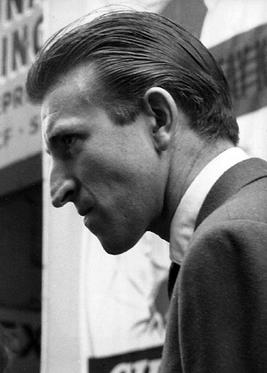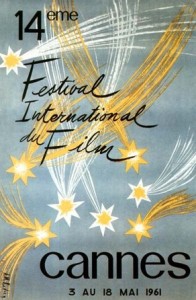The Penitent Thief, also known as the Good Thief, Wise Thief, Grateful Thief, or Thief on the Cross, is one of two unnamed thieves in Luke's account of the crucifixion of Jesus in the New Testament. The Gospel of Luke describes him asking Jesus to "remember him" when Jesus comes into his kingdom. The other, as the impenitent thief, challenges Jesus to save himself and both of them to prove that he is the Messiah.

Manhattan Melodrama is a 1934 American pre-Code crime drama film, produced by MGM, directed by W. S. Van Dyke, and starring Clark Gable, William Powell, and Myrna Loy. The movie also provided one of Mickey Rooney's earliest film roles. The film is based on a story by Arthur Caesar, who won the Academy Award for Best Original Story. It was also the first of Myrna Loy and William Powell's fourteen screen pairings.

St. Louis University High School (SLUH) is an all-male Jesuit high school in St. Louis, Missouri. Founded in 1818, it is the oldest secondary educational institution in the United States west of the Mississippi River, and one of the largest private high schools in Missouri. It is located in the Archdiocese of St. Louis.

Irvin Kershner was an American director for film and television.

Mother Joan of the Angels is a 1961 Polish religious horror art film on demonic possession, directed by Jerzy Kawalerowicz, based on a novella of the same title by Jarosław Iwaszkiewicz, loosely based on the 17th century Loudun possessions. The film won the Special Jury Prize at the 1961 Cannes Film Festival.

Henri Colpi was a French film editor and film director.

The Gold of Naples is a 1954 Italian anthology film directed by Vittorio De Sica. It was entered into the 1955 Cannes Film Festival. In 2008, the film was included on the Italian Ministry of Cultural Heritage’s 100 Italian films to be saved, a list of 100 films that "have changed the collective memory of the country between 1942 and 1978."

The 14th Cannes Film Festival was held from 3 to 18 May 1961. The Palme d'Or went to the Une aussi longue absence, directed by Henri Colpi and Viridiana, directed by Luis Buñuel. The festival opened with Che gioia vivere, directed by René Clément.

The Sun Shines Bright is a 1953 American comedy-drama Western film directed by John Ford, based on material taken from a series of Irvin S. Cobb "Judge Priest" short stories featured in The Saturday Evening Post in the 1910s, specifically "The Sun Shines Bright", "The Mob from Massac", and "The Lord Provides".
Morris A. Shenker was an American lawyer best known for his connections to labor leader Jimmy Hoffa and Teamster funding of Las Vegas in the 1960s.
William Krasner was an American mystery novelist.
Richard Allen Markowitz was an American film and television composer. He was the father of singer Kate Markowitz.

The Hoodlum Saint is a 1946 American drama film directed by Norman Taurog and starring William Powell, Esther Williams and Angela Lansbury.

The Hoodlum is a 1919 silent film comedy-drama produced by and starring Mary Pickford and released through First National. The film was directed by Sidney A. Franklin and was based on the novel Burkeses Amy by Julie Mathilde Lippmann.

Hoodlum Empire is a 1952 American film noir crime film directed by Joseph Kane starring Brian Donlevy, Claire Trevor, Forrest Tucker, Vera Ralston, Luther Adler and John Russell. It was inspired by the Kefauver Committee hearings dealing with organized crime.

Traveling Man is a 1989 American comedy film directed by Irvin Kershner and written by David Taylor. The film stars John Lithgow, Jonathan Silverman, Margaret Colin, John Glover, John M. Jackson and Chynna Phillips. The film premiered on HBO on June 25, 1989.
Wine of Morning is a 1955 American film directed by Katherine Stenholm and starring Al Carter, Joan DeVolk, and Katherine Helmond. It has Barabbas as the subject, who was pardoned according to the Biblical report in place of Jesus Christ by Pontius Pilate.
Charles Dismas Clark (1901–1963) was an American Jesuit priest based in St. Louis. In 1959, he created the first halfway house to support men coming out of prison: Dismas House. Clark knew that if a man coming out of prison could be given a decent place to live and a job, he rarely returned to prison. However, if a man did not receive such support he had a very high chance of committing another crime and returning to prison. For his work with ex-convicts, Clark earned the moniker "The Hoodlum Priest." In 1960, actor Don Murray came to St. Louis to film the movie The Hoodlum Priest on Father Clark's effort to create Dismas House.
Walter Wood was an American film producer and businessman.
Stephen A. Werner is a college instructor and writer from St Louis.












